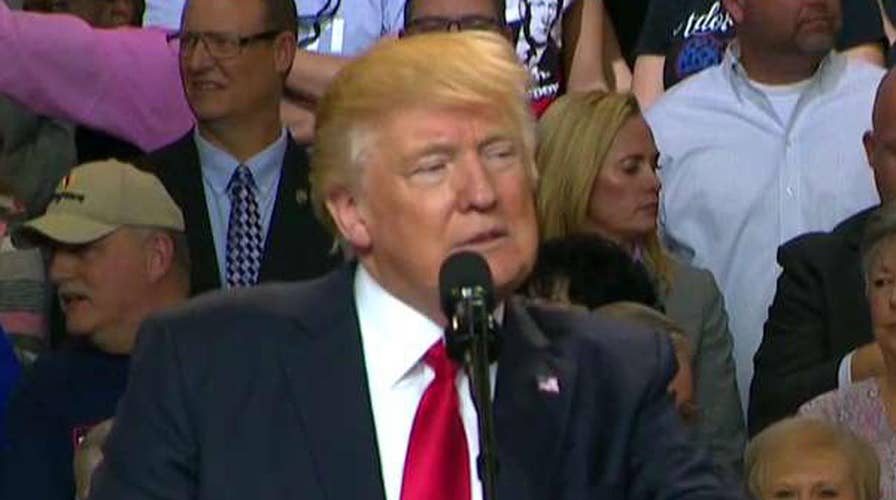Trump: We're taking back power from the political class
President Trump addresses supporters at rally in Louisville, Kentucky
President Trump again went outside Washington to whip up support for House Republicans' health care bill Monday, telling a rally in Louisville, Ky. that the legislation "is our chance to end ObamaCare and the ObamaCare catastrophe."
"This is our long-awaited chance to finally get rid of Obamacare." Trump told the crowd at the city's Freedom Hall. "It's a long-awaited chance. We're going to do it."
In a speech peppered with shout-outs to Kentucky's congressional delegation — "Hey, Mitch," Trump asked Senate Majority Leader Mitch McConnell at one point, "we gonna be OK? ... That health care's looking good?" — the president warned the crowd that if the health bill did not pass, "the alternative is what you have [and] what you have is nothing."
Trump also attempted conciliation toward Sen. Rand Paul, R-Ky., one of the bill's most outspoken opponents, saying, "I look forward to working with him so we can get this bill passed — in some form."
Echoing House Speaker Paul Ryan, R-Wis., Trump told supporters that the GOP health bill was a necessary step before enacting sweeping tax reform, another cornerstone of his agenda.
"We've got to get this done before we can do the other," Trump told the crowd. "In other words, we have to know what this is before we can do the big tax cuts. We've got to get it done for a lot of reasons, but that's one of them."
Trump's speech capped a day of meetings and phone calls aimed at helping the much-criticized legislation through the House ahead of a floor vote Thursday. The president was to meet with House Republicans on Capitol Hill Tuesday morning in what could be a major test of his deal-making abilities.
At the White House on Monday, the president met with Ryan, Health and Human Services Secretary Tom Price and Dr. Ezekiel Emanuel, an architect of Obama's health care law and the brother of Obama's White House chief of staff, Chicago Mayor Rahm Emanuel.
On Capitol Hill, Counselor to the President Kellyanne Conway met with the House Republican whip team, responsible for ensuring that the health bill has the requisite 218 votes on Thursday.
Sources told Fox News that members implored Conway to persuade Trump to endorse revisions to the bill that are expected to be laid out in a so-called "manager’s amendment" ahead of the floor vote this week.
Trump's aides and congressional Republicans spent the weekend trying to woo conservatives and moderate House members who have questioned the health care plan. Rep. Steve Scalise, R-La., the House's No. 3 Republican and the leader responsible for rounding up votes, wrote Sunday night to his whip team that the "next few days could define us for years to come."
"There's no such thing as 'perfect.' Each of us has our own ideal plan, but if we want to advance our principles and fulfill our promises, this bold approach achieves our objectives," Scalise wrote.
Many hard-line conservatives have pushed for a more complete repeal of Obama's law, including its requirement that policies cover a long list of services, which they say drives up premiums. They also complain that the GOP bill's tax credits create an overly generous benefit the federal government cannot afford.
"We need substantive changes," said Rep. Jim Jordan, R-Ohio, a member of the conservative House Freedom Caucus, said late Monday. "There's gotta be fundamental change."
Rep. Justin Amash, R-Mich., wrote on Twitter that fellow Freedom Caucus members had suggested several changes but had been rebuffed.
Moderate Republicans, meanwhile, have said the tax credits are too limited and would hurt low earners and older patients. They also worry the plan would leave too many people uninsured, pointing to a nonpartisan Congressional Budget Office analysis that estimated 24 million people would lose coverage over 10 years.
The White House and House Republicans have agreed that the bill will be amended to let states impose work requirements on some healthy Medicaid recipients. States will also be allowed to alter the entire federal-state program for poorer people so states would receive a lump sum federal payment to cover some costs — not an amount that's pegged to the number of beneficiaries in the state, as the current bill provides.
Fox News' Chad Pergram and the Associated Press contributed to this report.





